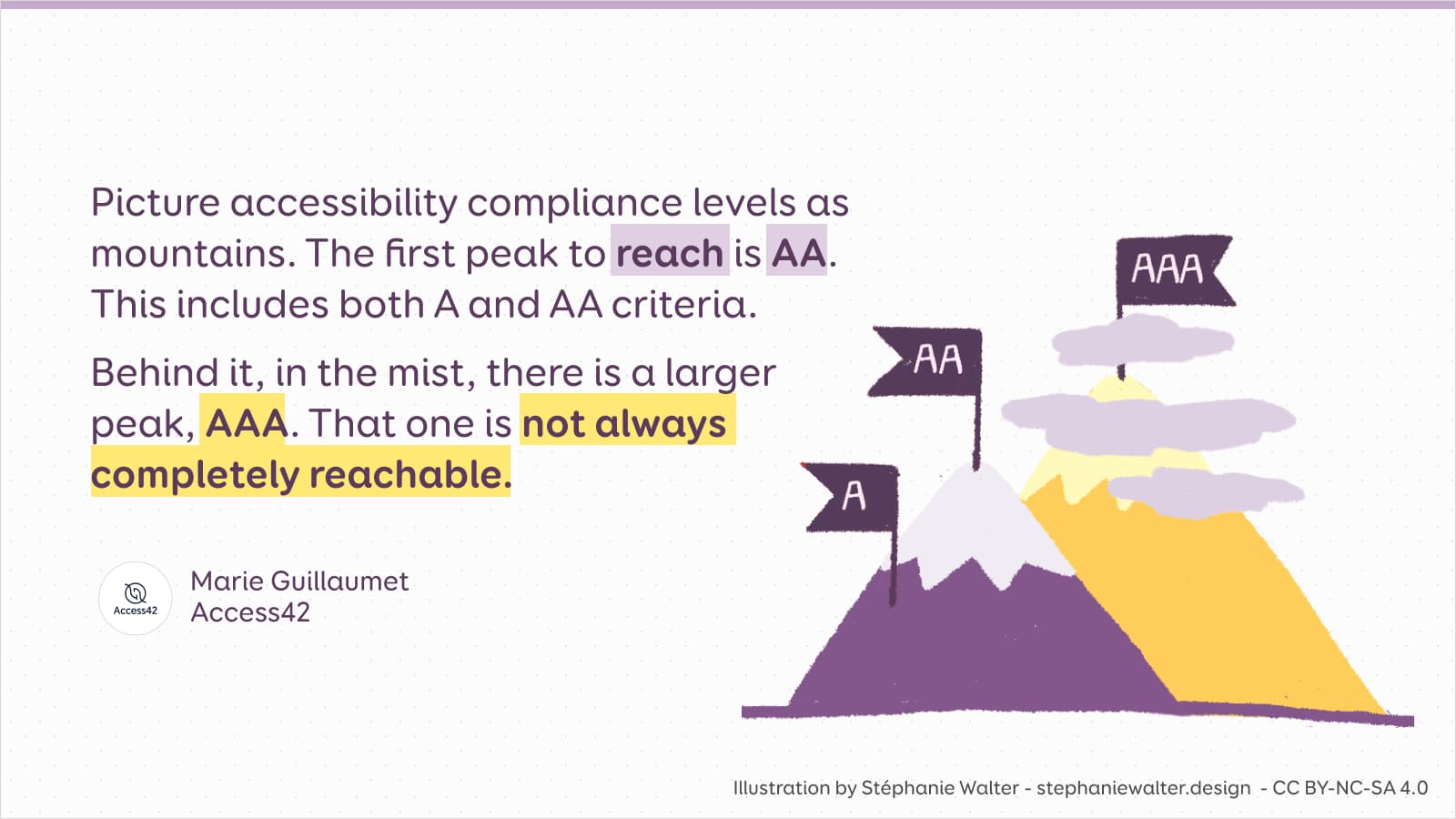JupyterLab Accessibility Statement
Contents
JupyterLab Accessibility Statement#
Jupyter audits#
This section includes audits from different stakeholders on Jupyter products.
JupyterLab v3.4.5 400% Zoom Audit - conducted in 2022
JupyterLab v2.2.6 WCAG 2.1 - conducted in 2020
Jupyter Notebook WCAG 2.0 - conducted in 2019
Many of the issues identified in these audits can be tracked in this GitHub project within the JupyterLab organization
Accessibility Statement for JupyterLab#
Edited from the W3C accessibility statement generator
This is an accessibility statement from Jupyter accessibility contributors.
The current state of JupyterLab#
Jupyter accessibility statements are living documents. This statement was created on 16 May 2022 using the W3C Accessibility Statement Generator Tool with additions and edits from the Jupyter accessibility contributors community.
Note
This statement was last updated on the 09 of August 2022.
Conformance status#
The Web Content Accessibility Guidelines (WCAG) defines requirements for designers and developers to improve accessibility for people with disabilities. It defines three levels of conformance: Level A, Level AA, and Level AAA. JupyterLab is nonconforming with WCAG 2.1 level AA. Nonconforming means that the content does not meet the accessibility standard.

By Stéphanie Walter (Source)
JupyterLab’s accessibility does not exist in isolation. JupyterLab inherits much from the many projects it is built upon and its accessibility conformance may impact projects built off of JupyterLab or its components. The accessibility of this ecosystem is interlinked, so conformance may need to be resolved at different levels in order to impact JupyterLab positively.
Compatibility with browsers and assistive technology#
JupyterLab is designed to be compatible with the following#
Operating systems:
Windows
macOS
Linux
iOS
Android
Browsers (mobile and desktop):
Firefox
Chrome
Safari
Chromium browsers
JupyterLab is not compatible with#
Operating systems:
Browsers (mobile and desktop):
Internet Explorer
Edge
Assistive technology:
Technical specifications#
Accessibility of JupyterLab relies on the following technologies to work with the particular combination of web browser and any assistive technologies or plugins installed on your computer:
HTML
WAI-ARIA
CSS
JavaScript
These technologies are relied upon for conformance with the accessibility standards used.
Limitations and alternatives#
Despite our best efforts to ensure accessibility of JupyterLab, there may be some limitations. Below is a description of known limitations, and potential solutions. Please contact us if you observe an issue not listed below.
Known limitations for JupyterLab:
Documents: Documents written by the community may not include accessible content because we do not and cannot review every document that can be opened and edited in JupyterLab. To support accessible documents, we are drafting guidelines for accessible document content with an emphasis on Jupyter notebooks. Please report the issue to the author and open an issue on jupyter/accessibility describing the problem and the behavior you expect, so we may integrate it into our content guidelines.
JupyterLab extensions: JupyterLab extensions written by the community may not be accessible because JupyterLab extensions can be written by anyone in the community and have no standard review process. We do not and can not review every JupyterLab extension. To support accessible extensions, we encourage extension authors to use existing, accessible JupyterLab components for their extensions. We also provide periodic opportunities for community education on accessibility. Please report the issue to the author and let them know the jupyter/accessibility community may be able to provide guidance.
Assessment approach#
Jupyter accessibility contributors assessed the accessibility of JupyterLab by the following approaches:
Self-evaluation
Regular automated testing to monitor for regressions (can be found at the jupyter-a11y-testing repository).
User feedback
Evaluation report#
An evaluation for JupyterLab is available at: jupyterlab/jupyterlab/issues/9399.
User reports on JupyterLab’s accessibility are available at:the jupyterlab/jupyterlab label
tag:accessibility.
What the community is doing#
Measures to support accessibility#
Jupyter accessibility contributors take the following measures to ensure accessibility of JupyterLab:
Include accessibility as part of our mission statement.
Provide continual accessibility training for our community.
Assign clear accessibility goals and responsibilities.
Employ formal accessibility quality assurance methods.
Document changes, approaches, and improvements to the above methods and to JupyterLab itself.
Tip
For more information on current efforts to improve JupyterLab’s accessibility, visit the CZI - JupyterLab accessibility grant roadmap.
Feedback and Formal complaints#
We welcome your feedback and formal complaints on the accessibility status of JupyterLab. Please let us know if you encounter accessibility barriers on JupyterLab:
Write an issue on jupyterlab/jupyterlab and request it be labeled
tag:AccessibilityIf you are interested in being part of any potential research or organized feedback initiatives, please send an email with the subject line
Jupyter Accessibility Feedbackhere. Gauging community interest in user research participation helps us gain the support to make it happen.
Warning
At the time of writing, there is no non-public way to contact us for JupyterLab accessibility issues.
Please note that JupyterLab is an open-source project and that Jupyter accessibility contributors are a group defined on a voluntary basis. Like many other open-source projects, we cannot guarantee how long it may take to respond to and resolve an issue, though we do make an effort to do it as quickly as is possible with our resources. Thanks for your patience and understanding.